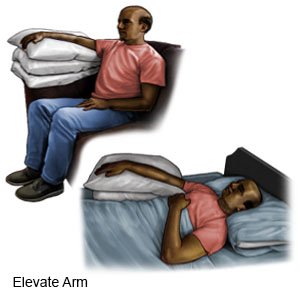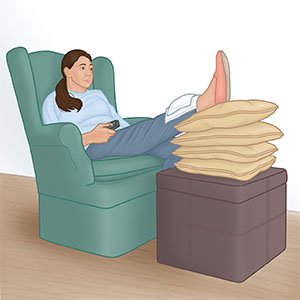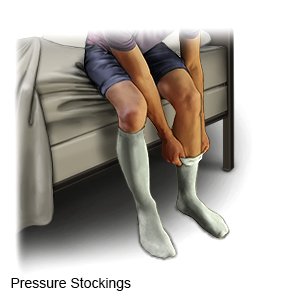Edema is swelling of both legs from a buildup of extra fluid. Edema has many possible causes:
- Prolonged standing or sitting, especially in hot weather, can cause excess fluid to accumulate in the feet, ankles and lower legs.
- Tiny valves inside the veins of the legs can become weakened, causing a common problem called venous insufficiency. This problem makes it more difficult for the veins to pump blood back to the heart, and leads to varicose veins and buildup of fluid.
- Severe chronic (long-term) lung diseases, including emphysema and chronic bronchitis, increase pressure in the blood vessels that lead from the heart to the lungs. This pressure backs up in the heart. The higher pressure causes swelling in the legs and feet.
- Congestive heart failure, a condition in which the heart can no longer pump efficiently, causes fluid buildup in the lungs and other parts of the body. Swelling is often most visible in the feet and ankles.
- Pregnancy can cause edema in the legs as the uterus puts pressure on the vena cava, a major blood vessel that returns blood to the heart from the legs. Fluid retention during pregnancy also can be caused by a more serious condition called preeclampsia.
- Low protein levels in the blood caused by malnutrition, kidney and liver disease can cause edema. The proteins help to hold salt and water inside the blood vessels so fluid does not leak out into the tissues. If a blood protein, called albumin, gets too low, fluid is retained and edema occurs, especially in the feet, ankles and lower legs.
Symptoms
Symptoms vary according to the type of edema and its location. In general, the skin above the swollen area will be stretched and shiny.

Diagnosis
To check for edema that is not obvious, you can gently press your thumb over the foot, ankle or leg with slow, steady pressure. If you have edema, you will see an indentation where you pressed. You should see a doctor to determine the cause of leg swelling. If both legs are swollen, your doctor will ask about other symptoms and will examine you. A urine test will show if you are losing protein from the kidneys. Blood tests, a chest X-ray and an electrocardiogram (EKG) also may be done.
Expected Duration
Edema can be temporary or permanent, and it can come and go depending on the cause.
Prevention
The only way to prevent edema is to prevent the cause. Smoking is the main cause of chronic lung disease. Congestive heart failure most often is caused by coronary artery disease, high blood pressure or drinking too much alcohol. To avoid leg swelling on long trips, stand up and walk around often. Ideally, you should get up once an hour. If that's not possible, then exercise your feet and lower legs while sitting. This will help the veins move blood back toward the heart.
Treatment
Treatment of edema focuses on correcting the cause of the fluid accumulation. A low-salt diet usually helps. You also should avoid drinking too much fluid. If you are not short of breath, elevate your legs above the level of your heart to keep swelling down. Your doctor might suggest that you take a low dose of a diuretic (water pill).

Limit your salt intake. Salt causes your body to hold water. Ask about any other changes to your diet.
For swollen ankles and feet caused by pregnancy, elevate your legs and avoid lying on your back to help improve blood flow and decrease swelling.
If you have mild leg edema caused by venous insufficiency, elevate your legs periodically and wear support (compression) stockings. Sometimes surgery is needed to improve the flow of blood through the leg veins.

Elevate your arms or legs as directed. Raise them above the level of your heart as often as you can. This will help decrease swelling and pain. Prop them on pillows or blankets to keep them elevated comfortably.
No matter what the cause of edema, any swollen area of the body should be protected from pressure, injury and extreme temperatures. The skin over swollen legs becomes more fragile over time. Cuts, scrapes and burns in areas that have edema take much longer to heal and are more likely to get infected.

Wear pressure stockings as directed. The stockings are tight and put pressure on your legs. This helps to keep fluid from collecting in your legs or ankles.

Stay active. Do not stand or sit for long periods of time. Ask your healthcare provider about the best exercise plan for you.
When To Call a Professional
Call your doctor immediately if you have pain, redness or heat in a swollen area, an open sore, shortness of breath or swelling of only one limb.
Prognosis
The outlook for edema of the legs depends on the cause. For most people with edema, the prognosis is excellent.
